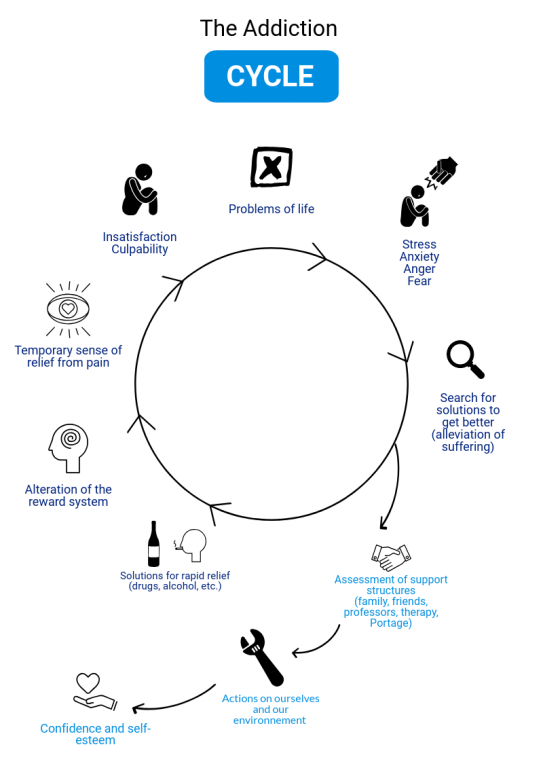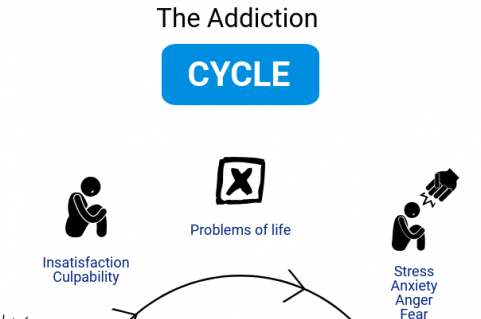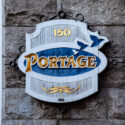The Addiction Cycle
Addiction to something, whether it be to cigarettes, alcohol, other drugs, or to certain behaviours (shopping, gambling, pornography, etc.), is hardly ever experienced as something pleasurable by a person who suffers from addiction, but rather, as a form of enslavement. Consuming substances, or chronically repeating a behaviour, is no longer a choice that can be controlled through willpower. As soon as a person has entered into an addiction cycle, they feel incapable of breaking free, without really knowing why. The need to use drugs is stronger than anything else, even with all the willpower in the world. Stanton Peele, a substance abuse specialist, demonstrated the mechanisms at play in the cycle of addiction.
How We Get In
The average person is regularly burdened with problems in life. Whether they be financial, professional, emotional, relational or familial, they generate stress, anxiety and sometimes anger or fear in all of us. In other words they result in feelings that we don’t always know how to handle (Read The Treacherous Pitfalls of Drugs and Alcohol). As a result, we go in search of solutions in order to feel better and to alleviate our suffering.
We are faced with two options during this search and both lead down very different paths: solutions for rapid relief or else an assessment of your support structures. The first drags us into a toxic cycle and the second helps us to escape it.
Solutions for rapid relief have the advantage of being very efficient and therefore very attractive. They involve taking something that will allow us to feel instant pleasure (alleviation of suffering). For some it’s alcohol, for others it’s cannabis or cigarettes, for a few it’s shopping, fast food, Internet , etc. All these substances or behaviours have an impact on the brain and its reward system by altering our grey matter and indicating which path to take in the future (Read Are We All Equal in the Face of Addiction?). And this is where we sink further and further into the addiction cycle.
Have you heard of dopamine? Nicknamed the happiness hormone, it is produced naturally by the body and originally aided with survival instincts such as eating. When dopamine is artificially stimulated by a substance or a certain behaviour in a repetitive manner, the brain always asks for more. It has understood that the effects of dopamine are a lot more exhilarating than that which is naturally produced (alteration of the reward system, read Nine natural ways to boost dopamine levels).
Yes, the effect is exhilarating in the moment and this gives us a very real sense of relief from pain and suffering, however, the effects remain short-lived and the exhilaration makes way for dissatisfaction and guilt. Once the dopamine levels drop, stress, anxiety, anger and fear resurface. Nothing has been dealt with, we are now back at the starting point. As everyone knows, substance abuse or addictive behaviours do nothing but exacerbate what we are running from: stress, anxiety, depression, etc. We are weakened and as soon as another problem appears, the addiction cycle begins once again.
How We Get Out
However, if we take the second path, assessing your support structures instead of seeking rapid relief, the possibility of leaving the addiction cycle becomes achievable. This means seeking help from our family, friends, professors, therapy groups, Portage, etc., helping us to influence ourselves and our environment in order to better cope with the emotions triggered by problems in life. In doing so, confidence and self-esteem improve and we are better equipped to handle the ups and downs of life and to fully enjoy it when moments of happiness come around.







Lissa Poggi
Great explanation! Will use this with my students. Thanks!
Terry
The only problem with this model is that assumes that the phong that leads us to the first use in the circle is stress fear pain etc. With many it is the opposite that leads to the first use. “Celebrate” rather than “medicate”. I count myself among those.
Adrian Lupu
For myself, I found out that the celebration time was not satisfactory enough by its own so I got bored if I did not consume alcohol or cigarettes, socially. When I did, I felt “a fully experience”. I don’t know if you can have a good party with great company and still feel the behavioral need (the substance need may still be there, so maybe that is the issue in your case).